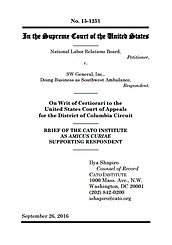NLRB v. SW General, Inc.
Learn more about Cato’s Amicus Briefs Program.
Under the default constitutional rule, all federal officials are nominated by the president with the “advice and consent of the Senate.” But sometimes, when an unexpected vacancy arises, appointing and confirming a replacement can take a while. Congress knows this, and that’s why it has enacted—and frequently updated—the Vacancies Act. The latest version, called the Federal Vacancies Reform Act (FVRA), authorizes the president to bypass advice and consent by appointing temporary “acting officers” to fill certain vacancies. But Congress is keenly aware that such a unilateral appointment power can be easily abused. That’s why acting officers serve under a strict 210-day time limit. It’s also why “a person may not serve as an acting officer” if that person is nominated to be the permanent officer (with an exception only for longtime first assistants). Nonetheless, in January 2011, President Obama nominated Lafe Solomon to be the permanent general counsel of the National Labor Relations Board (NLRB) while he was serving—and continued to serve—as the acting general counsel. When Solomon later brought enforcement proceedings against an ambulance company, SW General, that company objected on the grounds that Solomon was no longer validly serving as acting general counsel once he was nominated for the permanent job. The U.S. Court of Appeals for the D.C. Circuit agreed based on a straightforward reading of the text of the FVRA, but the NLRB appealed to the Supreme Court. Cato has filed an amicus brief supporting SW General and urging the Court to adopt a “clear statement” rule when interpreting statutes that let the president bypass advice and consent. The NLRB’s only textual argument is that a phrase in the preamble to the FVRA’s disqualification clause, “notwithstanding subsection (a)(1),” means that the disqualification for permanent nominees only applies to a subset of acting officers. But as the D.C. Circuit has previously explained, “notwithstanding” means “in spite of,” not “for purpose of” or “with respect to.” Courts shouldn’t strain to read statutes contrary to their natural reading—especially ones that aren’t even ambiguous in the first place. Just the opposite: The Framers recognized that “advice and consent” would be a core check-and-balance mechanism. That’s why it is only through the express act of Congress that the appointment of particular officials can be vested in “the President alone.” It’s clear that the Framers intended such waivers of advice and consent to be the exception to the rule, and that is indeed how the system has developed. When the Constitution sets such a default equilibrium between two branches of government, the Supreme Court has recognized that the burden must always be on those who would alter that equilibrium. Absent a clear statement of Congress, the constitutional presumption is that both the president and the Senate must assent to the appointment of every high-ranking official, whether serving permanently or for a limited tenure. Giving the benefit of the doubt to an unauthorized appointment like that of Lafe Solomon would turn this presumption on its head.



